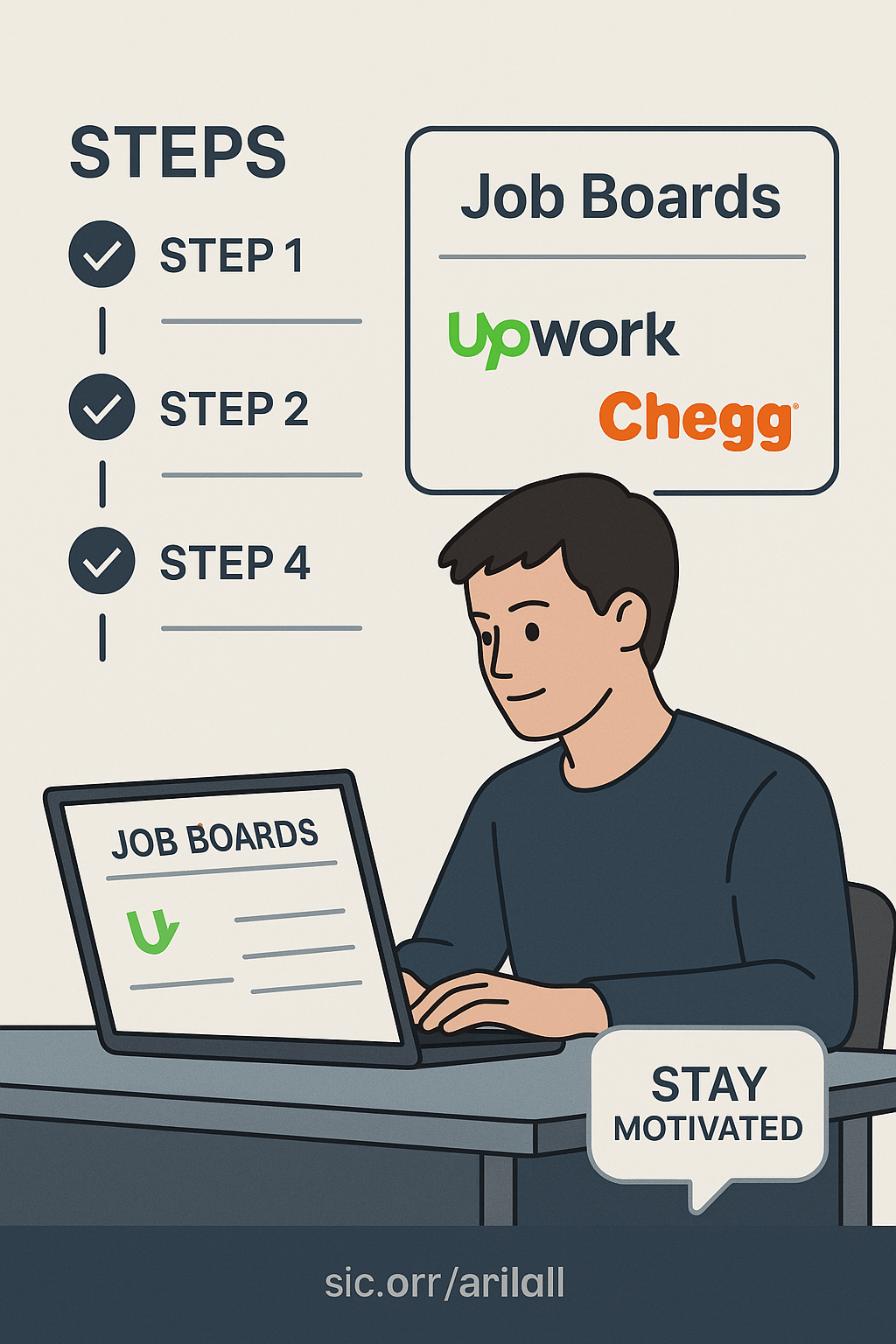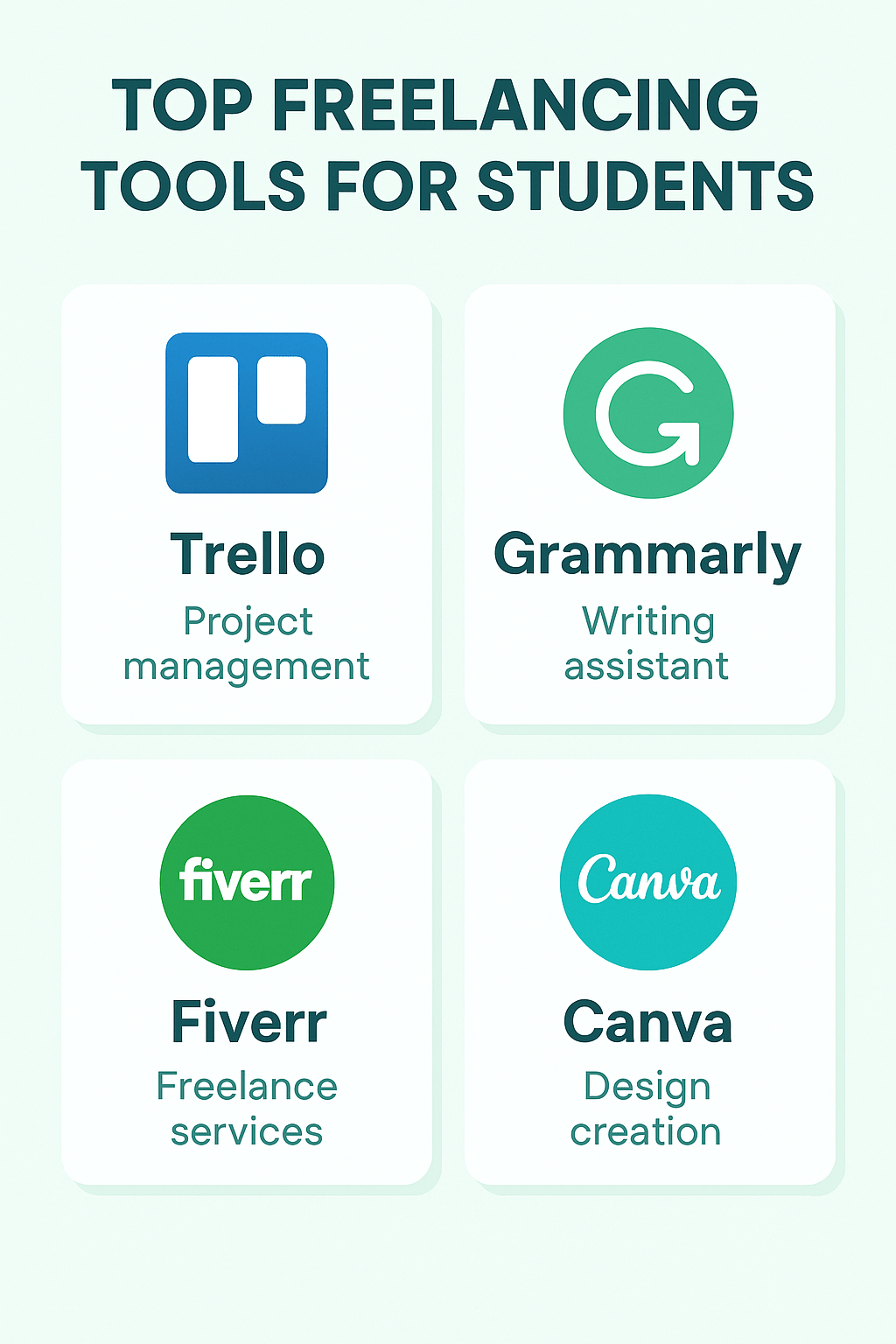Table of Contents
Introduction
Finding online jobs for students in USA can feel overwhelming with academic pressure and time constraints. But the right strategy can help students earn good money, gain experience, and maintain flexibility—all from their dorms or homes.
This comprehensive guide provides:
- Step-by-step methods to find online work
- Top platforms offering legitimate student-friendly jobs
- Essential tools and tips to thrive in remote gigs
What you’ll learn:
- How to prepare for online jobs
- Where to find the best student job platforms
- Tips to balance studies and work
Time investment: 1–2 hours to set up, then flexible daily/weekly hours
Skill level: Beginner-friendly with scope to grow

Prerequisites/Requirements
Before diving into online jobs, students should consider:
- Basic Skills Needed: Email etiquette, internet research, typing, communication
- Tools Required: Laptop, stable internet, Zoom/Google Meet, Gmail
- Time Commitment: As little as 5–10 hours/week for part-time gigs
- Skill Level: Beginner to intermediate
- Budget: Most opportunities require no upfront cost; free platforms available
Alternatives: If students lack experience, internships or micro-task platforms can be a stepping stone.
Step-by-Step Process
Step 1: Identify Your Strengths and Interests
Start by listing subjects or skills you’re good at—writing, design, tutoring, coding.
- Pro Tip: Use free tools like Skill Assessment on Coursera
- Avoid: Applying for everything. Focus your search for better matches.
- Outcome: A shortlist of roles that suit your academic or creative strengths.
Step 2: Create a Professional Online Profile
Use platforms like LinkedIn, Upwork, or Fiverr to create a student freelancer profile.
- Include: profile photo, headline, description, skills, and any certifications.
- Mistake to Avoid: Using casual language or missing out on profile sections.
- Outcome: Appealing profile that attracts clients and job offers.
Step 3: Search Student-Friendly Job Platforms
Some of the best platforms for online student jobs in the USA include:
- Upwork (freelancing)
- Tutor.com (online tutoring)
- Chegg (study help)
- Rev.com (transcription)
- PeoplePerHour
Use filters like “entry-level,” “part-time,” or “student-friendly.”
- Tip: Bookmark jobs and apply during peak activity times (morning EST).
Step 4: Apply to Entry-Level Jobs Smartly
Write personalized cover letters and tailor your resume for each application.
- Use tools like Zety or Canva for resume templates.
- Focus on how your academic skills can help the client.
- Avoid: Copy-pasting generic applications.
- Progress Check: Apply to at least 10 jobs in your first week.

Set a Schedule and Track Time
Use tools like Trello or Notion to manage tasks and Google Calendar to set hours.
- Block study hours first, then add work slots.
- Pro Tip: Use the Pomodoro technique for high productivity.
- Mistake to Avoid: Overcommitting—balance is key.
Step 6: Communicate Like a Pro
Reply to clients/employers on time. Use email templates, maintain tone professionalism.
- Tools: Grammarly, Google Docs templates
- Quick Fix: Use auto-reply for time zone gaps
- Result: Builds trust and ensures long-term job continuity
Step 7: Deliver Quality Work and Ask for Feedback
Always meet deadlines and follow instructions. After completion:
- Politely request a review
- Use feedback to improve profile
- Avoid: Arguing or ghosting clients
This leads to recurring work and referrals!
Advanced Tips & Best Practices
- Specialize: Don’t stay generic—niche down to become a known expert
- Upskill Regularly: Use free certifications (Google Digital Garage, Coursera)
- Portfolio: Build a mini-website using Carrd or Notion for free
- Avoid Burnout: Take short breaks, manage screen time
- Stay Secure: Never pay to get a job, avoid scams
- Join Communities: Reddit (r/freelance), Facebook Groups for Students
Tools & Resources
Here are must-have tools for student freelancers:
| Tool | Use Case | Free/Paid |
|---|---|---|
| Trello | Task Management | Free |
| Grammarly | Writing/Editing | Free + Pro |
| Canva | Resume & Design | Free |
| Clockify | Time Tracking | Free |
| Fiverr/Upwork | Job Platforms | Free |
Cost Consideration: Stick to free tools initially. Upgrade only if necessary.
Community Support: Check forums like Upwork Community, Reddit Freelancers, Discord servers for tips.

Measuring Success & Optimization
Evaluate success using:
- Job application to success ratio
- Earnings per hour
- Client feedback and reviews
- Number of repeat clients
- Skill progression (certifications, experience)
Use Google Sheets or Notion to track performance. Adjust your strategy monthly.
Next Steps & Advanced Techniques
Once you’ve gained confidence:
- Explore higher-paying gigs (SEO, coding, design)
- Try affiliate marketing or blog monetization
- Build a niche skill and offer packages
- Follow online freelancing courses
- Join niche LinkedIn groups and pitch directly to businesses
Stay current by following blogs and YouTube creators in your niche.
Conclusion
With the right tools, mindset, and strategy, online jobs for students in USA are not only possible—they’re empowering. From tutoring to freelancing, students can build a career path while studying.
Start small, stay consistent, and scale your efforts. Your first paycheck might be small, but the experience is priceless.
Take action today—create your profile, apply smartly, and enjoy financial freedom on your terms.
How long does it take to get your first online student job?
Usually 1–2 weeks with consistent applications and a strong profile. Focus on tailoring each application.
What if I don’t have experience?
Start with microtasks or tutoring. Use academic achievements as proof of your expertise. Volunteering also helps.
Do I need to pay to join online job sites?
No. Avoid platforms that ask for upfront payment. Use trusted sites like Upwork, Fiverr, or Tutor.com.
Can international students in the USA do online jobs legally?
Yes, if the job complies with your visa regulations. Always check with your university’s international office.
What are the best-paying online jobs for students?
Top roles include tutoring, writing, virtual assistance, and coding—paying $15–$40/hour depending on skill level.
Link Building Strategy
Internal Links:
- Learn the basics in our Student Productivity Guide
- Check our Freelance Writing for Beginners
- Master job interviews in our Online Interview Guide
External Links:
Start small, stay consistent—your student hustle can grow into a career!





